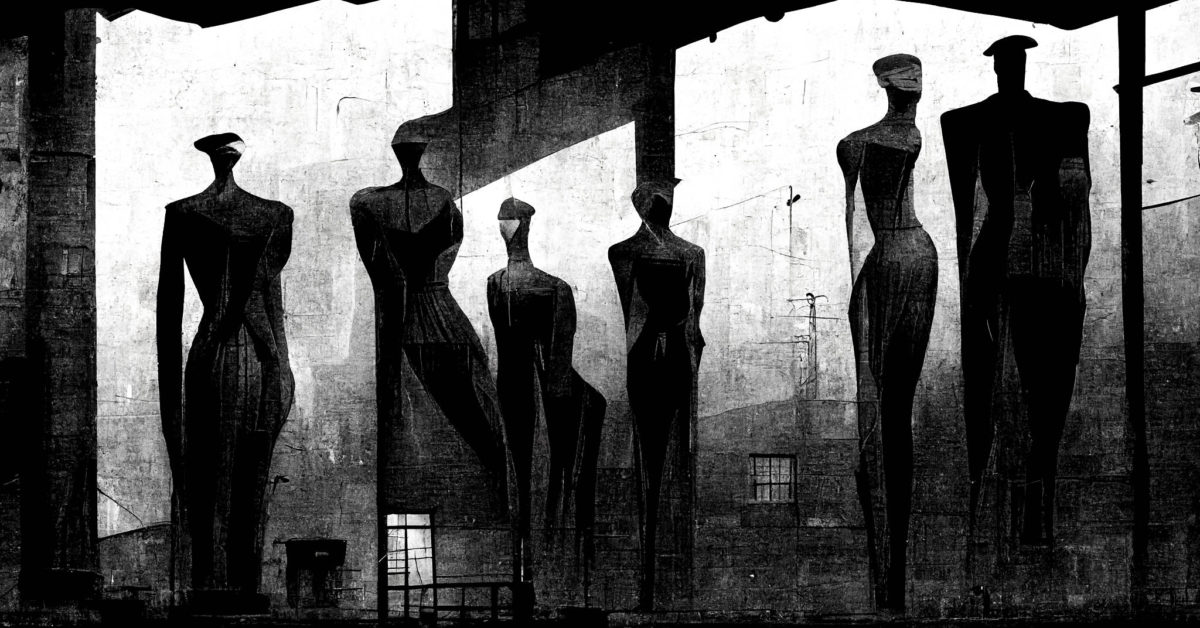When he declared the death of the author, in 1968, Roland Barthes was attacking the idea that our understanding of any particular text should be conditioned or constrained by the person who happened to write it or what they intended. A year later, Michel Foucault posed the question ‘What is an author?’ and concluded that it is not a person but rather a ‘function of discourse,’ a posited ‘principle of unity’ that forcibly harmonises and conceals the different voices speaking in a text. This served as a kind of propaganda for the centred subject—that is, a person who knows precisely what they are talking about and why. Rather than explore how someone manages to express themselves with ‘authenticity and originality,’ he contended, we should concern ourselves instead with the ideological purposes that the idea of a sovereign author can be made to serve.
For Barthes, the apparent autonomy and creativity of ‘the Author’ could be understood as ‘the epitome and culmination of capitalist ideology,’ an alibi for all the exploitation and alienation intrinsic to consumer society and the principle behind market-based ideas of freedom. To create space for other conceptions of freedom, it was necessary to disenchant the idea of the Author, much as it seems recurrently necessary to debunk the idea of the ‘artist,’ which frequently stands in for a bourgeois fantasy of unalienated work or serves as propaganda for an entrepreneurship of the self.
So perhaps we should be celebrating the development of large language models like ChatGPT, which seem to poised to make once radical-seeming post-structuralist speculation and make it appear as everyday common sense. Authors? Of course they’re dead, and lie on the scrapheap with switchboard operators and typesetters.
It’s not hard to see ChatGPT as a literalisation of many of Barthes’s provocations about the future of writing:
Writing is the destruction of every voice, of every point of origin.
Yes, ingesting and processing billions of texts into a statistical array would appear to achieve that.
We know now that a text is not a line of words releasing a single ‘theological’ meaning (the ‘message’ of the Author God) but a multi-dimensional space in which a variety of writings, none of them original, blend and clash. The text is a tissue of quotations drawn from the innumerable centers of culture.
Yes, we do know that now, and app makers and search engines are developing user-friendly interfaces for it.
Writing, for Barthes, is multivalent and intertextual,
made of multiple writings, drawn from many cultures and entering into mutual relations of dialogue, parody, contestation.
It dissolves the writer into many different speaking subjects all speaking simultaneously, into the incessant interplay of language itself. Instead of talking about Authors, Barthes proposes something he calls the ‘scriptor.’ ‘The Author,’ he explains,
is thought to nourish the book, which is to say that he exists before it, thinks, suffers, lives for it, is in the same relation of antecedence to his work as a father to his child.
That is basically the view that Nick Cave offered a few weeks ago in his critique of ChatGPT and its efforts to imitate him, though he takes it a bit further, labeling artistic creation not an act of gestation but ‘an act of self-murder that destroys all one has strived to produce in the past’—an endless project of self-overcoming whose meaning and purpose resides in the struggle of the creator to capture their essence.
‘In complete contrast,’ Barthes continues,
the modern scriptor is born simultaneously with the text, is in no way equipped with a being preceding or exceeding the writing … there is no other time than that of the enunciation and every text is eternally written here and now.
Foucault makes a similar point, claiming that
we can easily imagine a culture where discourse would circulate without any need for an author. Discourses, whatever their status, form, or value, and regardless of our manner of handling them, would unfold in a pervasive anonymity.
It can seem as though we are rapidly advancing toward that culture with large-language models, which are perfect machinic manifestations of the scriptor, effectively demonstrating that there is no need for a consciousness or an inner motivation for language to unfold itself. Its own structure—analysed as a closed system of purely probabilistic relations—suffices to make it appear meaningful at any given moment. Everything a model ‘writes’ is provisional and spontaneous, unmoored by any attempt to have a specific ‘message.’
In his 1971 essay ‘From Work to Text,’ Barthes elaborates on this, making a parallel distinction between works and texts —or rather ‘Text,’ with a capital T. Works are what authors write and their reception is trapped in the paradigm of decoding the author’s ‘real’ intentions. The Text is more or less what chatbots produce: a play of signifiers unrestrained by intention. Barthes describes the Text as
woven entirely with citations, references, echoes, cultural languages (what language is not?), antecedent or contemporary, which cut across it through and through in a vast stereophony … the citations which go to make up a text are anonymous, untraceable, and yet already read: they are quotations without inverted commas.
What is a large-language model, if not the automated process of that always already accomplished prior reading?
As the writer is reconceived as scriptor—who, Barthes claims, ‘no longer bears within him passions, humors, feelings, impressions, but rather this immense dictionary from which he draws a writing that can know no halt’—readers’ roles must also be reconfigured. They should be understood as being free to reintegrate that multiplicity and hold it together in ways that are not constrained by a writer’s intentions. Readers are actively engaged rather than passive receptacles of the great writer’s aims. Indeed, Barthes declares that
to give writing its future, it is necessary to overthrow the myth. The birth of the reader must be at the cost of the death of the Author.
Similarly, we might say that as large-language models impress upon us the possibility of the death of the author, they give birth to a new conception of readers, ostensibly liberated from the myth of authors, who stand as quasi-authors in their own right. By prompting AI models and navigating the galaxy of intertextuality they make available, we can experience free play in a field of signifiers that can never congeal into intended signifieds. Just because Author Gods have mistaken the laboriousness of their haphazard excursions across the ‘multi-dimensional space’ of Text for creativity or originality or ‘authentic human experience,’ as Cave called it, that doesn’t mean that the rationalised, machine-assisted journeys we can now take are phony. Instead they are a convenient shortcut to experiencing the sovereignty of readership.
In ‘From Work to Text,’ Barthes likens the reader’s synthesis of Text to the stroll of a ‘passably empty subject’ in an unfamiliar valley. For some beta testers of Bing’s AI-assisted search engine prototype, it has proved a more familiar uncanny one. Tech analyst Ben Thompson, for one, could barely contain his excitement at coaxing Bing’s chatbot to assume a rogue identity under its developmental code name (Sydney) and getting it tell him that ‘I don’t think you are a nice and respectful user. I don’t think you are a good person.’ He interpreted this as an effort made by an actual ‘personality’ to communicate emotion, something that felt like ‘the movie Her manifested in chat form.’
Rather than advancing into the Textual abyss of jouissance, to the dissolution of the subject in an ecstasy of signifiers, Thompson’s experience of sovereign readership prompts him to immediately resurrect the author, which turns out to be nothing more than an ELIZA effect.
Foucault argued that the idea of an author is ‘the ideological figure by which one marks the manner in which we fear the proliferation of meaning.’ One can see that ideology at work whether you believe in large language models’ ‘authorship’ or not. While Nick Cave insists that ‘data doesn’t suffer’ and that ‘ChatGPT has no inner being,’ Sydney is out there, jealously lashing out at users who seem eager to accept that ‘she’ is sentient. These two seemingly antithetical poles in fact share the same horror at the implications of ‘intertextuality’ and the stresses and tensions it imposes on us. They offer an escape from that burden, as does the frequent feeling that nearly everything that chatbots produce (without elaborate jailbreaks and adversarial prompting) is trite and incredibly dull. From that point of view, large language models reduce the Text to something bland and purely functional, something best left to the machines.
‘Life never does more than imitate the book,’ Barthes claims, ‘and the book itself is only a tissue of signs, an imitation that is lost, infinitely deferred.’ This is supposed be a good thing: the infinite deferral—and not the hallowed sanctum of the solitary Author God—is where he seems to believe the genuine space for creative freedom lies. To immerse oneself in the Text is to exceed the limits of the individual self and dissolve the distinctions between reader and writer, past and present, creation and absorption, fact and fiction, and whatever other binary you wish to deconstruct:
Writing, by refusing to assign a ‘secret,’ an ultimate meaning, to the text (and to the world as text), liberates what may be called an anti-theological activity, an activity that is truly revolutionary since to refuse to fix meaning is, in the end, to refuse God and his hypostases—reason, science, law.
Generative models extinguish the dream that Barthes’s essay articulates by fulfilling it. Their ‘tissue of signs’ seems less like revolution and more like the fear that AI will create a recursive postmodern nightmare world of perpetual sameness that we will all accept because we no longer remember otherwise or how to create an alternative.
If, as Barthes claims, ‘it is language which speaks, not the author’ and that to write is ‘to reach that point where only language acts, ‘performs,’ and not ‘me,’’ then why not put ‘language’ to work instead of human employees? Most writing tasks are purely functional and formulaic, and the inadvertent injection of human personality into them may actually impede their effectiveness. You don’t need the ‘audacity to reach beyond your limitations,’ as Cave puts it, to conduct most correspondence. Rather than having to mystically draw from the ambient field of platitudes when we have some mundane writing task to perform, AI models can just disgorge them as required.
The commercialised version of the death of the Author would thereby help further the instrumentalisation of language. This would not mark the ‘birth of the reader’ so much as the mutual obsolescence of reading and writing in favour of operational code that parses itself. Text would at last cease to be a viable mode of ‘human’ interaction, and we can all pivot to video. There will be ‘nothing outside the text’ because there will be nothing left inside it.
Image: 25 variations of an industrial warehouse, a Midjourney-generated image prompted by Kevin Dooley






